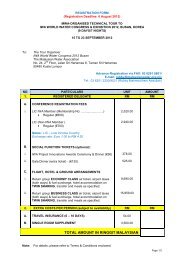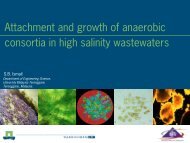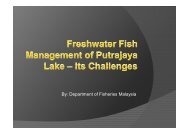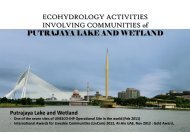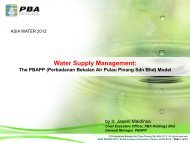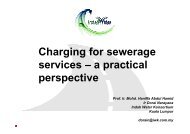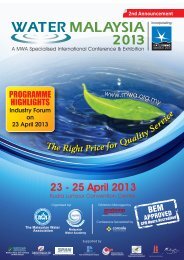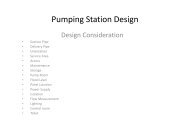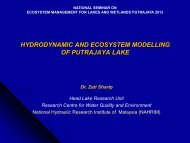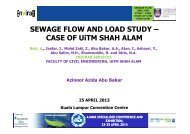Mr. Lau Hieng Ung, Director, Sewerage Services Department Sarawak
Mr. Lau Hieng Ung, Director, Sewerage Services Department Sarawak
Mr. Lau Hieng Ung, Director, Sewerage Services Department Sarawak
- No tags were found...
You also want an ePaper? Increase the reach of your titles
YUMPU automatically turns print PDFs into web optimized ePapers that Google loves.
News from Around the WorldCoca-Cola Malaysia and the Malaysian Nature Society (MNS)are calling on secondary school students to step up and make adifference this World Water Day.The students are being urged to gettheir peers to participate in the annual“Water Vision” contest, which challengesthem to identify and resolve a waterconservation issue.The competition is designed to fostera sense of water stewardship amongyouths.The winning team will receive arainwater harvesting system for theirschool as the grand prize. It will helpthem to save hundreds of ringgit, whileconserving clean water resources.Prizes which await the youngIndia’s new water policy draft calls for a shift in the role of the stateThe Indian government on January31 released a draft National WaterPolicy, 2012 which recommends a gradualshift in the role of the state from a serviceprovider to that of a regulator of servicesand facilitator for strengthening theinstitutions responsible for planning,implementation and management ofwater resources.It calls for the water related servicesto be transferred to community and/orprivate sector with appropriate PPP orPublic-Private-Partnership model.The policy calls for a broad, overarchingnational legal framework on waterand comprehensive legislation to developinter-state rivers and river valleys. Many ofthese issues are currently handled at thestate level.The draft policy has termed water asan “economic good” and supported pricingof water to maximise its value. It has alsostipulated approaches towards enhancingwater availability besides emphasising onwater use efficiency.The Government has been holdingconsultations with all stakeholders in thewater sector for drafting the NationalWater Policy, which Water ResourcesMinister Pawan Kumar Bansal hasindicated will be unveiled in March 2012.The first water policy was adoptedby National Water Resources Council in1987. This was revised and updated in April2002.The draft policy, which has beenposted on the website of Ministry ofWater Resources, has been kept open forcomments till February 29. After carryingnecessary modifications, it would beplaced before National Water Board andNational Water Resources Council forfinalisation and adoption.The draft policy recommends theenvironmentalists include cash andgadgets such as iPod Touch/iPad2.The top three teams will also be invitedto attend a special 3-day, 2-night at theMNS Environmental Interpretive Centerin Sepang where they will learn about theimportance of mangrove forest ecology,which is crucial to our ecosystem.“Water Vision” is open to secondaryschools nationwide through MNS’ KelabPencinta Alam.Students are required to work in teamsof four to submit a 15-minute multimediapresentation on how they can conservedevelopment of a system to evolvebenchmarks for water uses for differentpurposes, such as water footprints andwater auditing in order to ensure efficientuse of water. Project financing has beensuggested as a tool to incentivise efficientand economic use of water.It also provides for setting up of WaterRegulatory Authority and adequate waterpricing to incentivise recycle and re-use.The draft policy presents a holisticpicture of ecological need of the riverrather than restricting it to only minimumflow requirement. It states that theecological needs of the river should bedetermined recognising that river flowsare characterized by low or no flows, smallfloods, large floods and flow variability andshould accommodate development needs.A portion of river flows should be keptaside to meet ecological needs ensuringthat the proportional low and high flowreleases correspond in time closely to thenatural flow regime.The draft policy also recognises theneed to adapt to climate change in planningand implementation of water resourcesprojects. Coping strategies for designingand management of water resourcesstructures and review of acceptabilitycriteria have been emphasised.Mapping of the aquifers to know thequantum and quality of ground waterresources in the country has been proposedwith provision of periodic updating.The draft policy says Water UsersAssociations should be given statutorypowers to collect and retain a portion ofwater charges, manage the volumetricquantum of water allotted to them andmaintain the distribution system in theirjurisdiction.It also proposes a reversal of heavyunder-pricing of electricity, which leads towater in their school or community.This year’s theme is “The Best Practiceson Water Conservation in your School orCommunity”.Entries must address the problemsfaced by the local community or school,together with a practical solution.All entries must be submitted to MNSby July 20.For details, students and teachers canvisit www.mns.my or search for “WaterVision” on Facebook, or contact theEnvironmental Education <strong>Department</strong> at03-2287 9422.wasteful use of both electricity and water.The proposal is expected to face someopposition as several state governmentshave been providing almost free electricityto farmers, a move that has resulted inoverdrafts of groundwater across severalregions.The draft policy also recognisesencroachment and diversion of waterbodies and emphasises the need for theirrestoration with community participation.It has proposed setting aside a suitablepercentage of the costs of infrastructuredevelopment, which along with collectedwater charges, may be utilised for repair andmaintenance. Contracts for constructionof projects should have inbuilt provisionfor longer periods of proper maintenanceand handing over back the infrastructurein good condition.The policy says there is a need toremove the large disparity between watersupply in urban and rural areas to bringequality between rural and urban people.It has proposed a forum at the nationallevel to deliberate upon issues relating towater and evolve consensus, cooperationand reconciliation amongst states. Asimilar mechanism should be establishedwithin each state to amicably resolvedifferences in competing demands forwater amongst different users of water, asalso between different parts of the state.Appropriate institutional arrangementsfor each river basin should be developedto collect and collate all data on regularbasis with regard to rainfall, river flows,area irrigated by crops and by source,utilisation for various uses by both surfaceand ground water and to publish wateraccounts on daily basis every year foreach river basin with appropriate waterbudgets and water accounts based on thehydrologic balances.12 WaterMalaysia





